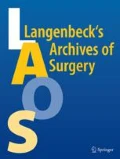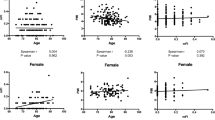Abstract
Purpose
This study was performed to determine the association of frailty and nutritional status with postoperative complications after total gastrectomy (TG) with D2 lymphadenectomy in patients with gastric cancer.
Methods
Patients undergoing TG with D2 lymphadenectomy for gastric cancer between August 2014 and February 2016 were enrolled. Frailty was evaluated by sarcopenia which was diagnosed by a combination of third lumbar vertebra muscle index (L3 MI), handgrip strength, and 6-m usual gait speed. Nutritional status was evaluated by the nutritional risk screening 2002 (NRS 2002) score. Univariate and multivariate analyses evaluating the risk factors for postoperative complications were performed.
Results
A total of 158 patients were analyzed, and 27.2 % developed complications within 30 days of surgery. One patient died within 30 days of the operation. In the univariate analyses, NRS 2002 score ≥3 (OR = 2.468, P = 0.012), sarcopenia (OR = 2.764, P = 0.008), and tumor located at the cardia (OR = 2.072, P = 0.046) were associated with the postoperative complications. Multivariable analysis revealed that sarcopenia (OR = 3.084, P = 0.005) and tumor located at the cardia (OR = 2.347, P = 0.026) were independent predictors of postoperative complications.
Conclusions
This study showed a significant relationship between postoperative complications and geriatric frailty using sarcopenia in patients with gastric cancer after TG with D2 lymphadenectomy. Frailty should be integrated into preoperative risk assessment and may have implications in preoperative decisionmaking.
Similar content being viewed by others
References
Torre LA, Bray F, Siegel RL et al (2015) Global cancer statistics, 2012. CA Cancer J Clin 65:87–108
Bray F, Ren JS, Masuyer E et al (2013) Global estimates of cancer prevalence for 27 sites in the adult population in 2008. Int J Cancer 132:1133–1145
Kim JP (2002) Current status of surgical treatment of gastric cancer. J Surg Oncol 79:79–80
Japanese Gastric Cancer A (2011) Japanese gastric cancer treatment guidelines 2010 (ver. 3). Gastric Cancer 14:113–123
Bozzetti F, Marubini E, Bonfanti G et al (1997) Total versus subtotal gastrectomy: surgical morbidity and mortality rates in a multicenter Italian randomized trial. The Italian Gastrointestinal Tumor Study Group. Ann Surg 226:613–620
Gockel I, Pietzka S, Gonner U et al (2005) Subtotal or total gastrectomy for gastric cancer: impact of the surgical procedure on morbidity and prognosis—analysis of a 10-year experience. Langenbecks Arch Surg 390:148–155
Schmidt B, Yoon SS (2013) D1 versus D2 lymphadenectomy for gastric cancer. J Surg Oncol 107:259–264
Galizia G, Lieto E, De Vita F et al (2015) Modified versus standard D2 lymphadenectomy in total gastrectomy for nonjunctional gastric carcinoma with lymph node metastasis. Surgery 157:285–296
Randle RW, Swords DS, Levine EA, et al. (2016) Optimal extent of lymphadenectomy for gastric adenocarcinoma: a 7-institution study of the U.S. gastric cancer collaborative. J Surg Oncol
Chen FF, Huang DD, Lu JX et al (2016) Feasibility of total gastrectomy with D2 lymphadenectomy for gastric cancer and predictive factors for its short- and long-term outcomes. J Gastrointest Surg 20:521–530
Bartlett EK, Roses RE, Kelz RR et al (2014) Morbidity and mortality after total gastrectomy for gastric malignancy using the American College of Surgeons National Surgical Quality Improvement Program database. Surgery 156:298–304
Watanabe M, Miyata H, Gotoh M et al (2014) Total gastrectomy risk model: data from 20,011 Japanese patients in a nationwide internet-based database. Ann Surg 260:1034–1039
Tegels JJ, Hulsewe KW, Sosef MN et al (2015) Morbidity and mortality after total gastrectomy for gastric malignancy: do not forget about geriatric frailty and nutrition. Surgery 157:406–407
Ejaz A, Spolverato G, Kim Y et al (2015) Impact of body mass index on perioperative outcomes and survival after resection for gastric cancer. J Surg Res 195:74–82
Kawamura H, Tanioka T, Tahara M et al (2013) Postoperative complication rates and invasiveness of laparoscopy-assisted distal gastrectomy and open distal gastrectomy based on the American Society of Anesthesiologists classification system. Asian J Endosc Surg 6:170–176
Makary MA, Segev DL, Pronovost PJ et al (2010) Frailty as a predictor of surgical outcomes in older patients. J Am Coll Surg 210:901–908
Partridge JS, Harari D, Dhesi JK (2012) Frailty in the older surgical patient: a review. Age Ageing 41:142–147
Correia MI, Waitzberg DL (2003) The impact of malnutrition on morbidity, mortality, length of hospital stay and costs evaluated through a multivariate model analysis. Clin Nutr 22:235–239
Guo W, Ou G, Li X et al (2010) Screening of the nutritional risk of patients with gastric carcinoma before operation by NRS 2002 and its relationship with postoperative results. J Gastroenterol Hepatol 25:800–803
Tegels JJ, de Maat MF, Hulsewe KW et al (2014) Value of geriatric frailty and nutritional status assessment in predicting postoperative mortality in gastric cancer surgery. J Gastrointest Surg 18:439–445, discussion 445–436
Wagner D, DeMarco MM, Amini N et al (2016) Role of frailty and sarcopenia in predicting outcomes among patients undergoing gastrointestinal surgery. World J Gastrointest Surg 8:27–40
Fielding RA, Vellas B, Evans WJ et al (2011) Sarcopenia: an undiagnosed condition in older adults. Current consensus definition: prevalence, etiology, and consequences. International working group on sarcopenia. J Am Med Dir Assoc 12:249–256
Zhuang CL, Wang SL, Huang DD et al (2015) Risk factors for hospital readmission after radical gastrectomy for gastric cancer: a prospective study. PLoS One 10, e0125572
Kondrup J, Allison SP, Elia M et al (2003) ESPEN guidelines for nutrition screening 2002. Clin Nutr 22:415–421
Charlson ME, Pompei P, Ales KL et al (1987) A new method of classifying prognostic comorbidity in longitudinal studies: development and validation. J Chronic Dis 40:373–383
Clavien PA, Barkun J, de Oliveira ML et al (2009) The Clavien-Dindo classification of surgical complications: five-year experience. Ann Surg 250:187–196
Chen LK, Liu LK, Woo J et al (2014) Sarcopenia in Asia: consensus report of the Asian Working Group for Sarcopenia. J Am Med Dir Assoc 15:95–101
Cesari M, Kritchevsky SB, Newman AB et al (2009) Added value of physical performance measures in predicting adverse health-related events: results from the Health, Aging And Body Composition Study. J Am Geriatr Soc 57:251–259
Mourtzakis M, Prado CM, Lieffers JR et al (2008) A practical and precise approach to quantification of body composition in cancer patients using computed tomography images acquired during routine care. Appl Physiol Nutr Metab 33:997–1006
Mitsiopoulos N, Baumgartner RN, Heymsfield SB et al (1985) Cadaver validation of skeletal muscle measurement by magnetic resonance imaging and computerized tomography. J Appl Physiol 85:115–122
Zhuang CL, Huang DD, Pang WY et al (2016) Sarcopenia is an independent predictor of severe postoperative complications and long-term survival after radical gastrectomy for gastric cancer: analysis from a large-scale cohort. Medicine (Baltimore) 95, e3164
Cruz-Jentoft AJ, Baeyens JP, Bauer JM et al (2010) Sarcopenia: European consensus on definition and diagnosis: report of the European Working Group on Sarcopenia in Older People. Age Ageing 39:412–423
Bonenkamp JJ, Hermans J, Sasako M et al (1999) Extended lymph-node dissection for gastric cancer. N Engl J Med 340:908–914
Cuschieri A, Fayers P, Fielding J et al (1996) Postoperative morbidity and mortality after D1 and D2 resections for gastric cancer: preliminary results of the MRC randomised controlled surgical trial. The Surgical Cooperative Group. Lancet 347:995–999
Mueller N, Murthy S, Tainter CR, et al. (2015) Can sarcopenia quantified by ultrasound of the rectus femoris muscle predict adverse outcome of surgical intensive care unit patients as well as frailty? A Prospective, Observational Cohort Study. Ann Surg
Fukuda Y, Yamamoto K, Hirao M, et al. (2015) Sarcopenia is associated with severe postoperative complications in elderly gastric cancer patients undergoing gastrectomy. Gastric Cancer
Huang DD, Wang SL, Zhuang CL et al (2015) Sarcopenia, as defined by low muscle mass, strength and physical performance, predicts complications after surgery for colorectal cancer. Color Dis 17:O256–O264
Reisinger KW, van Vugt JL, Tegels JJ et al (2015) Functional compromise reflected by sarcopenia, frailty, and nutritional depletion predicts adverse postoperative outcome after colorectal cancer surgery. Ann Surg 261:345–352
Wang SL, Zhuang CL, Huang DD et al (2016) Sarcopenia adversely impacts postoperative clinical outcomes following gastrectomy in patients with gastric cancer: a prospective study. Ann Surg Oncol 23:556–564
Tegels JJ, van Vugt JL, Reisinger KW et al (2015) Sarcopenia is highly prevalent in patients undergoing surgery for gastric cancer but not associated with worse outcomes. J Surg Oncol 112:403–407
Van Vugt JL, Levolger S, Coelen RJ et al (2015) The impact of sarcopenia on survival and complications in surgical oncology: a review of the current literature. J Surg Oncol 112:681–682
Kaiser MJ, Bauer JM, Ramsch C et al (2010) Frequency of malnutrition in older adults: a multinational perspective using the mini nutritional assessment. J Am Geriatr Soc 58:1734–1738
Vandewoude MF, Alish CJ, Sauer AC et al (2012) Malnutrition-sarcopenia syndrome: is this the future of nutrition screening and assessment for older adults? J Aging Res 2012:651570
Liu K, Zhang W, Chen X et al (2015) Comparison on clinicopathological features and prognosis between esophagogastric junctional adenocarcinoma (Siewert II/III Types) and distal gastric adenocarcinoma: retrospective cohort study, a single institution, high volume experience in China. Medicine (Baltimore) 94, e1386
Bornschein J, Dingwerth A, Selgrad M et al (2015) Adenocarcinomas at different positions at the gastro-oesophageal junction show distinct association with gastritis and gastric preneoplastic conditions. Eur J Gastroenterol Hepatol 27:492–500
Di Girolamo FG, Situlin R, Mazzucco S et al (2014) Omega-3 fatty acids and protein metabolism: enhancement of anabolic interventions for sarcopenia. Curr Opin Clin Nutr Metab Care 17:145–150
Smith GI, Atherton P, Reeds DN et al (2011) Dietary omega-3 fatty acid supplementation increases the rate of muscle protein synthesis in older adults: a randomized controlled trial. Am J Clin Nutr 93:402–412
Martin L, Birdsell L, Macdonald N et al (2013) Cancer cachexia in the age of obesity: skeletal muscle depletion is a powerful prognostic factor, independent of body mass index. J Clin Oncol 31:1539–1547
Mir O, Coriat R, Dhooge M et al (2012) Feasibility of gemcitabine and oxaliplatin in patients with advanced biliary tract carcinoma and a performance status of 2. Anticancer Drugs 23:739–744
Tan LJ, Liu SL, Lei SF et al (2012) Molecular genetic studies of gene identification for sarcopenia. Hum Genet 131:1–31
Acknowledgments
This work was supported by the foundation of the Health Department of Zhejiang province (2016139771) and the clinical nutriology of medical supporting discipline of Zhejiang province.
Authors’ contributions
Study conception and design: Cheng-Le Zhuang, Zhen Yu
Acquisition of the data: Fan-Feng Chen, Fei-Yu Zhang
Analysis and interpretation of the data: Fei-Yu Zhang, Xuan-You Zhou, Xian Shen
Drafting of the manuscript: Fan-Feng Chen
Critical revision of the manuscript: Cheng-Le Zhuang
Author information
Authors and Affiliations
Corresponding authors
Ethics declarations
All participants provided their written informed consent, and the protocol for this study was approved by the ethics committee of The First Affiliated Hospital of Wenzhou Medical University and in accordance with the 1964 Helsinki Declaration and its later amendments or comparable ethical standards.
Conflict of interest
The authors declare that they have no conflict of interest.
Additional information
Fan-Feng Chen and Fei-Yu Zhang contributed equally to this work.
Rights and permissions
About this article
Cite this article
Chen, FF., Zhang, FY., Zhou, XY. et al. Role of frailty and nutritional status in predicting complications following total gastrectomy with D2 lymphadenectomy in patients with gastric cancer: a prospective study. Langenbecks Arch Surg 401, 813–822 (2016). https://doi.org/10.1007/s00423-016-1490-4
Received:
Accepted:
Published:
Issue Date:
DOI: https://doi.org/10.1007/s00423-016-1490-4




